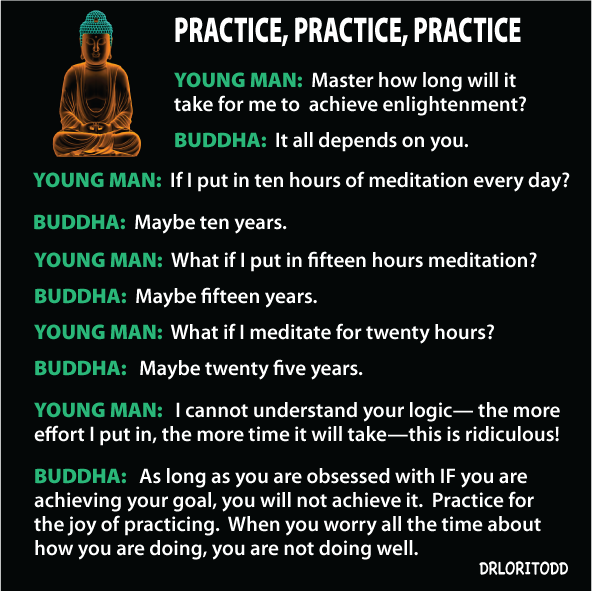 Mastery takes Practice. When people ask me, “How long will it take for me to be transformed? Transformation is like any other discipline. Practice, practice and more practice. How many hours does it take to make it to the Olympics? How many hours does it take to master any discipline and keep it alive? Transformation is not a destination, it is a Journey. And the Journey ends (as far as we know it) when our lives end. Mastery takes practice, whether it is transformation, music, meditation, sports or enlightenment. In an interview, the legendary cellist and humanitarian Pablo Casals was asked, “Why, at age 93, do you still practice three hours a day?” The Maestro said, “I’m beginning to show some improvement. Of course, I continue to play and practice. I think I would do so if I lived for another hundred years.”
Mastery takes Practice. When people ask me, “How long will it take for me to be transformed? Transformation is like any other discipline. Practice, practice and more practice. How many hours does it take to make it to the Olympics? How many hours does it take to master any discipline and keep it alive? Transformation is not a destination, it is a Journey. And the Journey ends (as far as we know it) when our lives end. Mastery takes practice, whether it is transformation, music, meditation, sports or enlightenment. In an interview, the legendary cellist and humanitarian Pablo Casals was asked, “Why, at age 93, do you still practice three hours a day?” The Maestro said, “I’m beginning to show some improvement. Of course, I continue to play and practice. I think I would do so if I lived for another hundred years.”
“I am a very simple man. I am a man first, an artist second. My first obligation is to the welfare of my fellow man. I will endeavour to meet this obligation through music, since it transcends language, politics and national boundaries.”
Pablo Casals practiced every day until the day he died in 1973 at the age of 96 even though he is regarded as the pre-eminent cellist of the first half of the 20th century, and one of the greatest cellists of all time. He made many recordings throughout his career, of solo, chamber, and orchestral music, also as conductor.
At the age of four he could play the violin, piano and flute; at the age of six he played the violin well enough to perform a solo in public. His first encounter with a cello-like instrument was from witnessing a local traveling Catalan musician, who played a cello-strung broom handle. In 1899, Casals played at The Crystal Palace in London, and later for Queen Victoria at Osborne House, her summer residence.
In 1901–1902 he made his first tour of the United States; and in 1903 toured South America. On January 15, 1904, Casals was invited to play at the White House for President Theodore Roosevelt. On March 9, of that year he made his debut at Carnegie Hall in New York.
“From the beginning of my life, I lived in music. My father was a real musician, but he didn’t have a real musical education. But even so, he played piano beautifully, and his compositions have grace and meaning.”
My father was a very modest man, and he thought that a man couldn’t make a living being a musician. He spoke to a friend who offered me a job as an apprentice carpenter. My mother opposed. She saw in me the gift of music, and she insisted that I become a musician.”
Jascha Heifetz is widely considered to be one of the finest violinists of modern times. Rumor is that a pedestrian on Fifty-seventh Street, Manhattan, stopped Jascha Heifetz and inquired, “Could you tell me how to get to Carnegie Hall?” “Yes,” said Heifetz. “Practice!”
Buddha
A young man went to Gautama Buddha and sought the Master’s guidance to achieve Enlightenment, The conversation went as follows:
Young Man: Master how long will it take for me to achieve enlightenment?
Buddha: It all depends on you.
Young Man: If I put in ten hours of mediation every day how long will it take?
Buddha: Maybe ten years.
Young Man: What if I put in fifteen hours meditation?
Buddha: Maybe fifteen years
Young Man: What if I meditate for twenty hours?
Buddha: Maybe twenty five years
Young Man: I cannot understand your logic—the more effort I put in, the more time it will take—this is ridiculous, Please explain.
Buddha: As long as you are fixated and obsessed about your goal you will not achieve it. Just do spiritual practice without one eye on the goal. 

